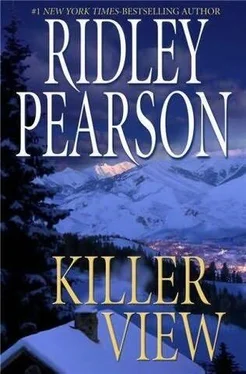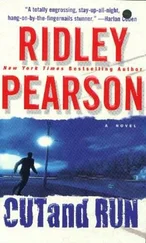“Not worth it.”
“They’re stored on an SD chip. The thing’s the size of a fingernail. You really think they’re going to search us that thoroughly? I could put it in my bra or something. They are not going to strip-search us.” When Walt failed to respond, she added, “Are they?”
“This is the U.S. military. Who knows what they’ll do? But if they find that chip, especially hidden on you, we would be in the deep stuff. These people don’t mess around.”
She was quiet for a moment, as she considered their options. “What if I encrypted them? I can password-protect the camera.”
“Child’s play for them. Besides, the more we look like we’re trying to hide something, the more heat we’re going to draw. We don’t need that. Erase them. I’ll buy you the ten minutes.”
“And if I can save them?”
“I’m telling you, it’s just not worth the risk. They’ll find them.”
“Not if I e-mail them before I erase them. My phone’s a PDA, Walt. It takes the same SD chip as the camera. You buy me enough time and I can switch out chips and e-mail at least a couple of the shots. They’ll be in cyberspace by the time we land. Keep your eye out for a cell tower. If you see one, try to stay close. I can do this.”
For the next ten minutes, Walt juggled stalling the air patrol’s increasingly heated demands he land the glider with Fiona’s run-on narration of her progress. She switched out the chips and had started e-mailing out the photographs, but the transmission speed of the photographs-all large-graphic files-was incredibly slow over her mobile phone.
Walt landed the glider a little hard-a little out of practice-causing Fiona to yelp from behind him. He rode the momentum off the strip’s lone runway and onto the first of three ramps. The helicopter set down just ahead of them, so close that the wind from the blades pushed the glider around like a toy, driving it back several feet and nearly damaging the tail. The chopper pilot killed the engine, and, as the blades slowed, two white SUVs with federal decals on their doors sped out to meet them.
“Where are we?” Walt called back to Fiona.
“I need more time,” she called out anxiously.
“Forget it. Just erase them.”
“The chip’s out of the camera; there’s nothing to erase. But I can’t erase them off the phone until they’re done sending and it’s taking forever.”
A uniformed officer pounded on the Plexiglas.
“Pocket the phone,” Walt instructed her, as he bent down low to make it appear he was busy shutting down the glider.
“OPEN UP!” the officer hollered.
“They’ll focus on the camera, not the phone,” Walt said, softly enough that the officer wouldn’t hear him through the cockpit dome.
“They will when they see there’s no chip in it,” she countered. “Wait! I’ve got a spare… Okay… okay… Buy me thirty seconds.”
She then bent over to where, in the tight space, her back screened her hands and the camera from view.
The officer pounded again.
“Ten seconds,” she pleaded.
Walt slid open the small triangular air vent on the side of the dome and moved his lips closer. “She’s feeling a little airsick. My passenger needs a moment.”
“Open this aircraft or I’m instructed to break it open for you.”
“Just let her get her sea legs, would you?” Walt pleaded.
“I’m okay,” she announced, sitting up and waving at the officer. She leaned forward, her chin on Walt’s shoulder, and whispered hotly, “The phone is still sending.”
“Purse,” he said, covering his lips as if itching his nose.
Walt unlocked the cockpit releases, and the officer instructed them to climb out of the plane. If caught, Walt thought his badge would bail them out. But seeing how serious these guys were, he wondered if he’d dragged Fiona into something he would soon wish he hadn’t.
She busied herself, collecting her gear.
“Please don’t touch anything, ma’am. We’ll get your belongings for you.”
“You most certainly will not,” Fiona protested. “He was the one flying the thing. It was his idea for a sunset sightseeing date. Why I agreed, I have no idea. Some date! I felt nauseated enough, and then you people came along? Who are you people?”
“You were flying in restricted airspace,” the officer said matter-offactly. He pointed to her headphones. “Did you hear our communication with the pilot?”
“All he told me,” she said distraughtly, still clinging to her purse and camera bag, “was that we were being forced down. And the funny thing is, I probably should be thanking you. I think you just saved me the trip back to Sun Valley.”
“Put the bags down, please, ma’am. Leave them there.”
“It’s my camera,” she protested.
“We’ll want a look at that,” he said.
“Walt! Do something. You’re the sheriff.”
The officer whipped around his head to take in Walt, who then introduced himself. “ Blaine County sheriff,” Walt added, proffering his ID wallet. The officer examined the wallet, his eyes flashing between his two subjects.
“Are you over here on business, Sheriff?” the officer asked.
“No. Just an evening flight, trying to impress a woman.”
“You really go all out,” Fiona said. “What do you do for the second date?”
Even the officer cracked a smile. He wiped it off quickly. “We’re going to want to talk to you,” he informed Walt. “Both of you,” he said, then looked at Fiona. “If it all checks out, I’m sure you’ve got nothing to worry about.”
Fiona cracked open her purse. “May I make a call?” she said, reaching the phone before the officer could move to stop her.
“It’s all to remain in place,” he said, holding out an open palm.
Fiona shot a sideways glance at Walt. She turned the face of the mobile device so that Walt could see it. His view of the colorful menu led him to believe the photographs had completed sending. “Can’t I call someone to come get me?” she asked the officer.
Walt understood then: the photographs had sent, but she hadn’t had time to erase them off the chip. The evidence remained in her hand.
“Apparently not,” Walt answered. “And I think they want your phone.”
As she handed it to the officer, she managed one more look in Walt’s direction-a serious look, one of deep concern. He took this as confirmation of his suspicions: the photographs were still on the phone’s memory chip.
“Maybe they’ll let you call once we get to wherever they’re taking us,” Walt suggested.
The officer didn’t contradict him.
“Who said they’re taking us anywhere?” Fiona complained. “All he said is, they want to talk to us.”
“People like this,” Walt said, “people like me, we always take you somewhere when we want to talk to you.”
Looking at Walt fiercely, she said, “Tell me this was all cooked up to impress me. Tell me this is your screwed-up attempt at a joke.” She then looked at the officer, as if he might confess to the conspiracy.
The officer said, “Afraid not.”
“As far as dates go,” Fiona said to Walt, settling into her role a little too easily he thought, “this one really sucks.”
“THE GLIDER’S RADIOS ARE FULLY FUNCTIONING. DID YOU know that?” Walt’s interviewer, a man who introduced himself as Russell Amish, was an unshapely man in his mid-forties who spoke his vowels in a nasal tone and carried a liverish blemish on the side of his neck like an abscessed high school hickey. A man who had once been physically strong, he’d gone soft, like fruit left in the bowl too long. His black eyes revealed a contempt for Walt’s badge.
Читать дальше












